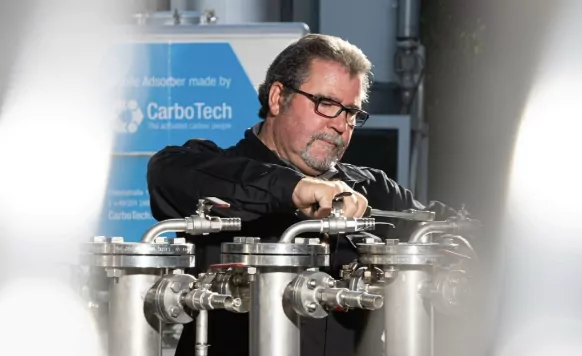- Service
- Sustainability

- Activated Carbon
- Applications
- Applications
- Air and Gas Purification
- Water treatment & waste water purification
- Food and beverage

- Fluid treatment
- Hydrogen purification
- Carbon molecular sieves (CMS)
- Individual applications

- Solutions
- About us
- News
Keyword-SearchContact us!Our experts will find the optimal solution for your request.

Carbon molecular
sieves (CMS)- Home
- Applications
Carbon molecular sieves (CMS)
Carbon molecular sieves
CarboTech is known across the world for innovations in the field of activated carbon. One thing to come out of our research and development work has been carbon molecular sieve (CMS) technology which is used in nitrogen production and other applications.
To obtain high-purity nitrogen, manufacturers rely on pressure swing adsorption (PSA). Compressed air is fed alternately into two containers filled with CMSs which capture oxygen molecules, leaving extremely pure nitrogen which is then directed into downstream collection tanks from where it can be fed directly into the customer’s grid.
CMSs are also used in these applications:
- Biogas upgrading
- Noble gas recovery
Robust, durable molecular sieves
CarboTech distributes products from OSAKA Gas Chemicals under exclusive arrangements in Europe, India and the Middle East. The CMSs are exceptionally hard, enabling short pressure equalisation times and high pressurisation and de-pressurisation rates. They are also great at self-regenerating, meaning they can be used for many years in nitrogen production environments.
Innovation with its roots in Essen
And that’s not all, because CarboTech is constantly working on further applications for our CMSs in partnership with a university of applied sciences. This gets the benefit of our decades of experience. We are constantly in close contact with our customers regarding possible uses, adaptations and product design improvements. This way, we know exactly what the market needs and can supply tailor-made solutions.
Optimised processes and thorough quality control are a matter of course for us. We provide our customers with CMS sieves that are ultra-efficient and offer the very best value for money.
- Sustainability